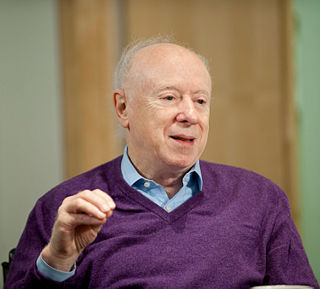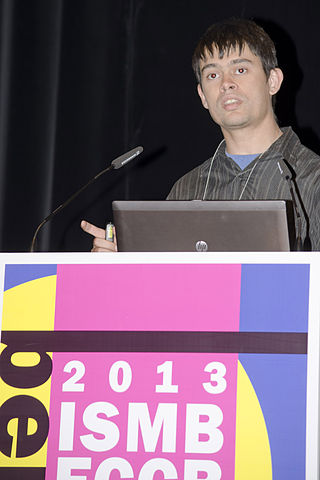
The University of Ottawa Heart Institute (UOHI) (French:Institut de cardiologie de l'Universitéd'Ottawa ) is Canada's largest cardiovascular health centre. It is located in Ottawa,Ontario,Canada. It began as a department in The Ottawa Hospital,and since has evolved into a complete cardiac centre,encompassing prevention,diagnosis,treatment,rehabilitation,research,and education.

Joseph Leonard Goldstein ForMemRS is an American biochemist. He received the Nobel Prize in Physiology or Medicine in 1985,along with fellow University of Texas Southwestern researcher,Michael Brown,for their studies regarding cholesterol. They discovered that human cells have low-density lipoprotein (LDL) receptors that remove cholesterol from the blood and that when LDL receptors are not present in sufficient numbers,individuals develop hypercholesterolemia and become at risk for cholesterol related diseases,notably coronary heart disease. Their studies led to the development of statin drugs.
deCODE genetics is a biopharmaceutical company based in Reykjavík,Iceland. The company was founded in 1996 by Kári Stefánsson with the aim of using population genetics studies to identify variations in the human genome associated with common diseases,and to apply these discoveries "to develop novel methods to identify,treat and prevent diseases."

Kári Stefánsson is an Icelandic neurologist and founder and CEO of Reykjavík-based biopharmaceutical company deCODE genetics. In Iceland he has pioneered the use of population-scale genetics to understand variation in the sequence of the human genome. His work has focused on how genomic diversity is generated and on the discovery of sequence variants impacting susceptibility to common diseases. This population approach has served as a model for national genome projects around the world and contributed to the realization of several aspects of precision medicine.

Steroid sulfatase (STS),or steryl-sulfatase,formerly known as arylsulfatase C,is a sulfatase enzyme involved in the metabolism of steroids. It is encoded by the STS gene.

Familial atrial fibrillation is an autosomal dominant heart condition that causes disruptions in the heart's normal rhythm. This condition is characterized by uncoordinated electrical activity in the heart's upper chambers,which causes the heartbeat to become fast and irregular.

In genomics,a genome-wide association study,is an observational study of a genome-wide set of genetic variants in different individuals to see if any variant is associated with a trait. GWA studies typically focus on associations between single-nucleotide polymorphisms (SNPs) and traits like major human diseases,but can equally be applied to any other genetic variants and any other organisms.

Atrial Light Chain-2 (ALC-2) also known as Myosin regulatory light chain 2,atrial isoform (MLC2a) is a protein that in humans is encoded by the MYL7 gene. ALC-2 expression is restricted to cardiac muscle atria in healthy individuals,where it functions to modulate cardiac development and contractility. In human diseases,including hypertrophic cardiomyopathy,dilated cardiomyopathy,ischemic cardiomyopathy and others,ALC-2 expression is altered.

Atrial fibrillation is an abnormal heart rhythm (arrhythmia) characterized by rapid and irregular beating of the atrial chambers of the heart. It often begins as short periods of abnormal beating,which become longer or continuous over time. It may also start as other forms of arrhythmia such as atrial flutter that then transform into AF.

Celivarone is an experimental drug being tested for use in pharmacological antiarrhythmic therapy. Cardiac arrhythmia is any abnormality in the electrical activity of the heart. Arrhythmias range from mild to severe,sometimes causing symptoms like palpitations,dizziness,fainting,and even death. They can manifest as slow (bradycardia) or fast (tachycardia) heart rate,and may have a regular or irregular rhythm.
Alirocumab,sold under the brand name Praluent,is a medication used as a second-line treatment for high cholesterol for adults whose cholesterol is not controlled by diet and statin treatment. It is a human monoclonal antibody that belongs to a novel class of anti-cholesterol drugs,known as PCSK9 inhibitors,and it was the first such agent to receive FDA approval. The FDA approval was contingent on the completion of further clinical trials to better determine efficacy and safety.
Michael Lee Boehnke is an American geneticist. He is the Richard G. Cornell Distinguished University Professor of Biostatistics at the University of Michigan School of Public Health,where he also directs the Center for Statistical Genetics. His research focuses on the genetic dissection of complex traits;in a career spanning 25 years,he has developed methods for analysis of human pedigrees,examined the history of breast cancer in genetically at risk individuals,and contributed important discoveries on the genetics of type 2 diabetes and related traits,such as obesity and blood lipid levels.
Masonic Medical Research Institute (MMRI) is a non-profit medical research center located in Utica,New York. The Institute's research and staff are independent,but gets its name from its original funding in 1958 by the Masonic Grand Lodge of New York.

Gonçalo Rocha Abecasis is a Portuguese American biomedical researcher at the University of Michigan,serves as Vice President &Chief Genomics and Data Science Officer at the Regeneron Genetics Center,and was chair of the Department of Biostatistics in the School of Public Health. He leads a group at the Center for Statistical Genetics in the Department of Biostatistics,where he is also the Felix E. Moore Collegiate Professor of Biostatistics and director of the Michigan Genomic Initiative. His group develops statistical tools to analyze the genetics of human disease.
A rare variant is a genetic variant which occurs at low frequency in a population. Rare variants play a significant role in both complex and Mendelian disease and are responsible for a portion of the missing heritability of complex diseases. The theoretical case for a significant role of rare variants is that alleles that strongly predispose an individual to disease will be kept at low frequencies in populations by purifying selection. Rare variants are increasingly being studied,as a consequence of whole exome and whole genome sequencing efforts. While these variants are individually infrequent in populations,there are many in human populations,and they can be unique to specific populations. They are more likely to be deleterious than common variants,as a result of rapid population growth and weak purifying selection. They have been suspected of acting independently or along with common variants to cause disease states.
Karen L. Mohlke is a biologist at University of North Carolina,Chapel Hill. She is known for her work in human genetics,especially in the area of diabetes research. She was one of the first researchers to use exome array genotyping.
Eleftheria Zeggini is a director of the institute of translational genomics in Helmholtz Zentrum München and a professor at the Technical University of Munich (TUM). Previously she served as a research group leader at the Wellcome Trust Sanger Institute from 2008 to 2018 and an honorary professor in the department of health sciences at the University of Leicester in the UK.
Robert Roberts,is a cardiologist,geneticist,academic,and medical researcher.

Rebecca Miriam Cunningham is an American emergency physician,researcher,and university administrator. She is the 18th and current president of the University of Minnesota.
Sharon Lee Reilly Kardia is an American epidemiologist. She is the Millicent W. Higgins Collegiate Professor of Epidemiology and Associate Dean for Education at the University of Michigan School of Public Health. Her research interests involve genetic epidemiology of common chronic diseases.











